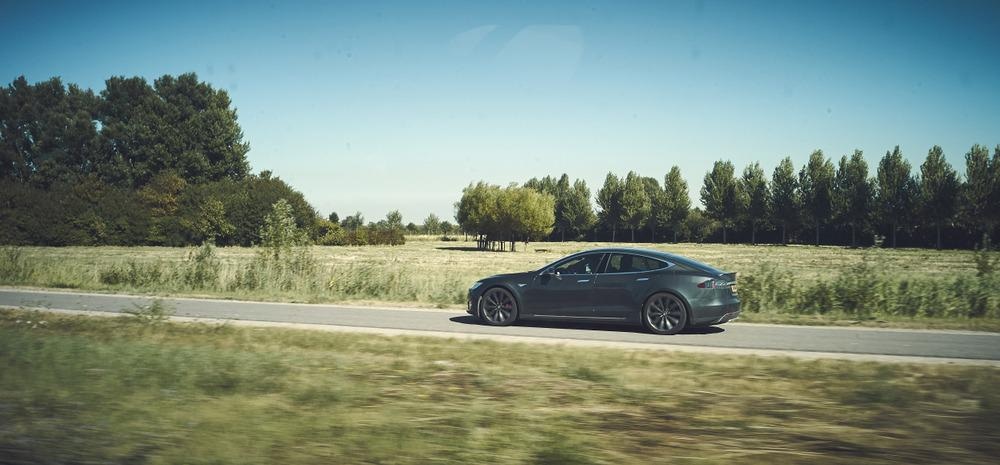While Tesla's least efficient vehicle is still more than 20% better than its nearest competitor, Panasonic has announced a prototype that could widen the gulf and fulfill Tesla's future battery dreams.

Image Credit: WildShutterPhotographie/Shutterstock.com
Tesla is consistently driving innovation in the electric vehicle (EV) market and has pledged to make significant changes and advances in future batteries. Now, with the support of the Japanese tech giant, the new battery will have five times more storage and will help Tesla reduce its production cost.
Furthermore, Panasonic has stated that its latest project, the development of Tesla's 4680, will be manufactured explicitly for Tesla vehicles. This further strengthens the ties between both companies. Kazuo Tadanobu, head of Panasonic's energy business, unveiled the battery prototype at a recent media roundtable citing a "strong desire of the other party" as to why Panasonic was developing the product.
No specific details have been released regarding when the 4680 batteries would be put into full-scale production, but the company plans to start "test production" early next year. Panasonic's development follows in the footsteps of Tesla's own plans to develop a 4680 battery: a battery that has dimensions of 46mm x 80mm.
Energy Solutions
Across the EV industry, vehicle manufacturers are consistently trying to improve batteries by increasing driving range and recharge speeds. When making improvements to battery cells, EV manufacturers may run into other issues such as increased battery size, leading to space-saving challenges and potential thermal management issues.
The new 4680 battery should offer more energy and therefore boost battery performance. Additionally, these batteries will be cheaper to produce by 50% compared to other models and should boost Panasonic's production by 100-fold over the next decade.
However, although the 4680 batteries offer certain energy solutions, they are larger in size and have provoked questions surrounding thermal management. Elon Musk recently addressed some of these concerns on Twitter stating, "Our new cell is 46mm diameter with steel shell & even that was huge challenge for propagation resistance."
Tesla's solution, which Panasonic may follow in production, was unveiled during last year's 'Battery Day' event and sees a change made to the form factor by placing coolant tubes above and below the cells to dissipate excess heat. When pairing this with an innovative tab-less battery design, Tesla has struck upon a formula for optimal thermal management in their 4680 batteries.
Tesla Battery Day
Video Credit: Tesla/Youtube.com
Company Ties
Panasonic has consistently worked with Tesla to find innovative and practical battery solutions, having previously manufactured an improved 2170 lithium ion-cell for the Tesla Model 3 in 2017.
The decision to move forward with 4680 production was "because of the strong desire of the other party, and we think this can only lead to stronger ties," according to Kazuo Tadanobu, Panasonic Vice President.
The Japanese-based electronics corporation has been a Tesla partner since 2012, when the Model S was first rolled-out. However, Tadanobu stated that the company has no plans to offer Lithium Iron Phosphate (LFP) EV batteries, which Tesla is seeking out.
As a result, Tesla has started to diversify its portfolio and network of battery manufacturers, making deals with South Korea's LG Energy Solutions and China's CATL, as well as moving some of its production in-house.
LFP batteries are safer and cheaper than nickel-based batteries, but offer less energy density and require an increased charging frequency. Further, LFP batteries are more environmentally friendly as they require fewer rare earth materials.
Tesla does plan to source LFP batteries from China's CATL and install these in some of its entry-level Model 3 and Model Y vehicles. By increasing its network of battery suppliers, Tesla is also aiming to make its entry-level vehicles more affordable while hoping to inspire innovation in fuel cell manufacturing.
Tadanobu expressed little concern regarding Tesla's supply diversification, saying the EV manufacturer was ready to buy everything Panasonic could make due to the high demand for EVs. For now, Panasonic will remain the sole external manufacturer and supplier of the 4680 batteries, although LG and CATL could follow suit.
Additionally, Panasonic's timeline of test production seems to align with Tesla's roll-out of its high-end vehicle range next year, which includes the much-anticipated Cybertruck. Tesla also recently confirmed that its own 4680 pilot production at its Freemont plant in California would supply the first run of vehicles, but expects its partners, including Panasonic, to help support increased volumes.
"Tesla's expectations for shipments from our North American factory are extremely strong," stated Tadanobu.
Panasonic's recent expansion has seen an increase in its annual North American battery capacity: 38-39 gigawatt-hours, up from 35-gigawatt hours in the year ending March 2021. Consequently, this would be sufficient enough for batteries in more than 400,000 Tesla Model S vehicles.
References:
Automotive News. (2021, October 25). Panasonic unveils prototype battery for Tesla. https://www.autonews.com/suppliers/panasonic-unveils-prototype-ev-battery-tesla
Szymkowski, S. (2021, October 25). Tesla's prototype battery with 5 times more energy storage comes to life at Panasonic. Roadshow. https://www.cnet.com/roadshow/news/tesla-battery-energy-storage-panasonic/
Disclaimer: The views expressed here are those of the author expressed in their private capacity and do not necessarily represent the views of AZoM.com Limited T/A AZoNetwork the owner and operator of this website. This disclaimer forms part of the Terms and conditions of use of this website.